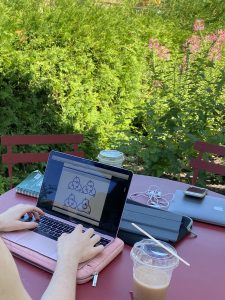
Preparing for the REU presentation. Photo credit: Teresa Brown.
So far, all of my posts have focused on historical research. But I started my journey at Columbia with the intention to major in mathematics and no plans to take a single history class.
In the spring of my freshman year I was accepted into Columbia’s Mathematics Department’s Summer Research Experience for Undergraduates (REU). I was ecstatic. A year prior, when I had just been accepted to Columbia and declared my interest in majoring in mathematics, I had scoured the department’s webpage for classes and research opportunities. I planned to apply to the REU program maybe sophomore or junior year. It was a long-term goal I set for myself, but I found myself presented with this opportunity much sooner than I expected.
Let’s back up for a second. What is an REU, and why was I interested in participating in one? In most STEM fields, individual departments host programs called REUs. These are programs, typically run during the summer months, designed for groups of undergraduates to pursue advanced research under the guidance of faculty mentors. REUs are intrinsically valuable in the opportunities for research that they provide, but they also hold an important place in the world of academia. For those interested in pursuing graduate study in STEM fields, it is common to get involved in some variety of undergraduate research. In mathematics specifically, virtually all students who pursue graduate study have completed at least one (if not multiple) REUs.
REUs are kind of like summer internships. They are intensive programs, i.e. research for 8 hours/day, 5 days/week for two months. Some universities’ REU programs have open applications, i.e. you don’t need to be studying full-time at that institution in order to apply. Because these programs have a larger applicant pool, they tend to be more competitive. At the same time, they provide the opportunity to make connections with faculty all over the country and pursue a wider variety of research topics. Other universities, like Columbia, host REU programs that are only open to internal applicants.
My REU experience was incredibly valuable, but not in the ways that I expected. Having only completed a single year of college level math classes, I had more catching up to do to understand the math problem we were trying to tackle than was even possible in a single summer. At times, I struggled with feeling that I wasn’t getting the “most” out of the experience because I was so far behind. Reflecting back on the experience, however, I don’t believe that I had a lesser experience than my peers. Rather, I learned different things from the experience. I didn’t discover or prove any new theorems and I don’t have my name on any published papers – outcomes that I might have expected. I did gain experience working directly with professors who are leaders in their fields. I practiced collaborating with my peers on a project and I faced the challenges of teaching myself entire textbooks worth of new information.
Since freshman year, my interests have shifted away from mathematics and towards history. The work that I did during my REU was very different from the historical research I have done since and discussed in my previous posts. Even though I don’t plan to pursue anything involving math research, I am grateful for my REU experience and believe that it gave me the skills to approach other kinds of research. Not every single research opportunity will necessarily have the fairy tale ending of a published paper. But as minimal as the tangible outcome might be, every research opportunity that you genuinely want to pursue has value.
